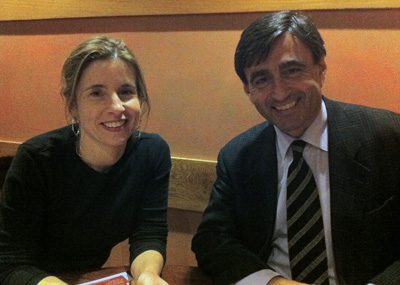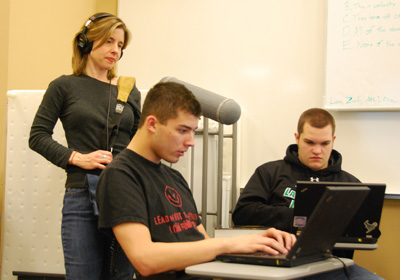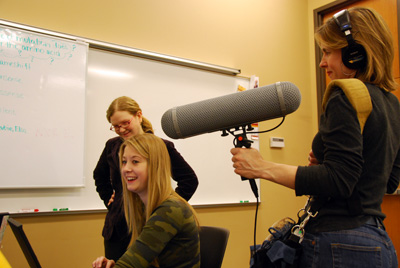The idea for this documentary began last fall while I was taking a walk around my neighborhood listening to my iPod, as I often do.
I had recently downloaded a bunch of podcasts from iTunes U and one of them was from MIT World, a site that provides video and audio of events at the Massachusetts Institute of Technology. The podcast I started listening to was a public lecture by a physics professor about, ironically enough, the problem with the traditional lecture (more on the irony later).
The professor was Carl Wieman. I'd never heard of him, though it turns out he's pretty famous. In 2001 he won a Nobel Prize for "the achievement of Bose-Einstein condensation in dilute gases of alkali atoms, and for early fundamental studies of the properties of the condensates." I have absolutely no idea what that means and I'm not motivated to find out.
But I was motivated to know more about something else Wieman is known for: research on how people learn.
How People Learn
The title of Wieman's talk is "Science Education in the 21st Century: Using the Tools of Science to Teach Science." The talk is about the growing importance of science education and what research on learning says about how education should change in order to help more people learn better.
For years I'd been reading books and articles and scribbling down all kinds of notes about research on learning. One of my favorite books is called "How People Learn: Brain, Mind, Experience and School." My copy is marked up, highlighted and dog-eared from the many times I've flipped through it.
I had been wanting to make some kind of documentary about how people learn, but I didn't know where to begin. You need a story to make a documentary work, and listening to Wieman's lecture helped me begin to imagine an outline for a story.
Wieman begins his lecture by talking about how the purpose of science education has changed because of big changes in society over the last 50 years.
His first point is that many of the major issues facing us as human beings are technical and scientific in nature; he cites global warming and genetic modification as examples. He argues that to have a "citizenry that can make wise decisions on some really tough choices and tough questions, they're going to have to be much more scientifically literate than they are now."
His second point is that more people need to be better educated in science because the economy demands it.
"The modern economy is so based on science and technology that pretty much independent of occupation one will do better, and the economy will do better, if one has some basic technical knowledge and problem-solving ability," Wieman says. What this means is that "we can't just worry about the next generation of scientists. We really have to think about how to make science education effective and relevant for a large fraction of the population."
Then he compares the way science is typically taught to the ancient practice of bloodletting.
"Namely, if anybody survives the treatment, it must be good," a statement that gets a soft chuckle from the MIT audience, who appear to be mostly scientists who survived the treatment and students who are trying to.
Traditional Approaches to Teaching
I grew up in the "bloodletting" era. Science was something only some of us were expected to master; the rest of us did something else.
I remember wanting to understand science better; I took four years of science in high school and, especially when it came to physics, I had a feeling it would be more interesting and meaningful if it were presented differently, but mostly I was bored and confused. I got good grades, but I don't think I learned much.
This is one reason Wieman's lecture captured my attention. The reason he held my attention for an hour and a half is that he went through all of this fascinating research about why the traditional approach to teaching science doesn't work.
He says the main culprit is the lecture, where a teacher stands up and talks, and students take notes. This is the way I learned science, plus a lab once a week where we mostly copied experiments from a book. I knew this "hands-on" experience was supposed to help me understand things better, but as I recall it rarely did.
Wieman talked about research from cognitive science that shows people can only process and remember a small amount of information at one time. He compared short-term memory to a computer with a small amount of RAM (random access memory) that gets confused and freezes up if you ask it to do too much at once. A typical lecture is information overload for the human brain.
So if a lot of the information presented in a typical lecture is too much for people to take in, how do people remember information? And how does anyone ever become a scientist if typical approaches to science education are not effective? The question Wieman asked in his lecture: How do people learn to become thinkers?
This is a question that puzzled Wieman for a long time. He began to unlock the puzzle by observing the graduate students who worked in his atomic physics lab. He noticed that, despite 17 years as successful students, the graduate students who came to work in his lab were typically "clueless about how to do physics."
But after a few years in the lab, they "transformed into expert physicists."
He wanted to know: How does that happen?
Becoming an Expert
This led Wieman to research being done by cognitive psychologists about the differences between novices and experts. I found this fascinating.
What psychologists have learned is that people who are learning a subject tend to see the content of that subject as isolated pieces of information.
"It's handed down by some authority and completely disconnected [from] the world outside the classroom," said Wieman.
In contrast, research shows people who have become experts see their subject area as a coherent structure of general concepts. Their knowledge is organized around "big ideas" that guide their thinking, affect what they notice, and help them interpret and organize information in their mind. These "big ideas" actually help experts recall facts when needed and help them retain important new information when encountered.
In addition, Wieman says that experts have the ability to "monitor their own thinking" in their area of expertise. They have the ability to ask themselves, "Do I really understand this, is this a sensible way to be solving this problem, how can I check my understanding?"
"Experts can do that. Novices can't," says Wieman.
For Wieman, the goal of education should be to help students become more expert-like in their thinking. But in fact, according to Wieman's own research, the traditional lecture-based approach to teaching physics tends to make students less expert in their thinking.
"Just about every introductory physics course makes the students actually more novice-like as a result of taking the class than they were before they ever started it," Wieman says, eliciting an audible "ah" from the MIT audience.
I found it shocking too. You take a class and you become less expert, not more?
Mental Effort
Carl Wieman says the problem with the traditional lecture is that it reinforces novice-like ways of thinking by focusing on facts and information rather than helping students develop conceptual understanding. He says the traditional lecture makes an assumption about learning that turns out not to be true.
The lecture approach implicitly assumes that "if you give the students' the factual knowledge, expert-like ways of thinking [will] come along for free," Wieman says.
But they don't.
What Wieman learned watching the graduate students in his lab is that they became experts by doing physics, day after day, year after year. Developing expertise requires extended, focused mental effort.
It's like exercise. If you want to get fit, you can't sit and watch someone exercise. You have to do it yourself.
Wieman says physics is the same way. You can't learn physics by listening to a professor talk and solve problems at the board; you have to do it. And you can't learn physics by copying lab experiments out of a book either. To learn physics, or any subject, you have to grapple with the "big ideas" and come to some understanding of them on your own. No one else can do it for you.
In the end, there really is no such thing as teaching. There is just learning. Teachers can help you learn by pushing you and prodding you and guiding you along the way. But they can't hand you knowledge, the way a traditional lecture is designed to do.
This idea that there is no such thing as teaching, only learning, is not something I heard from Carl Wieman. But it's what I was thinking about after listening to his lecture. And it is something that others subsequently said to me when I went out and did interviews for this documentary.
My original idea for this program was to make it about Carl Wieman: tell his story about discovering what's wrong with traditional approaches to teaching, and document what he does differently now in response.
Problem was, he is on leave from teaching and I couldn't even get in touch with him. He's now a science advisor to President Barack Obama, trying to put some of his ideas about science education into practice on a broader scale.
But Wieman was my inspiration.
I quickly discovered that there are many other physicists doing research on how people learn, and I thought that was interesting right there. Why are so many physicists doing education research? That's where the reporting for the documentary began.
As for the irony I mentioned at the beginning — a lecture on the problems with lecturing? Isn't that a double negative of some kind?
Here's what I've learned about that.
Lectures are indeed a convenient and common way to convey information. I learned a lot from his lecture.
But, two things.
First, I was really interested in what Wieman had to say so I was motivated to listen carefully for 90 minutes. The problem with traditional college lectures is that a lot of the students are not going to be interested and motivated to learn. In the past, it was only the people who were motivated and interested who ended up really learning the material, and becoming experts. They read the textbook, went to the professor for help; they learned it on their own. The physicists I interviewed told me this is how they learned.
Now that more people need to know more about science and be more "expert-like" in their thinking, schools and teachers need to think of new ways to get students motivated and interested enough to learn.
Second, I didn't really process that much of what Wieman said the first time around. I later listened to the entire lecture again and took detailed notes. I re-read those notes several times while making the documentary. And to write this essay, I watched the lecture again and took new notes.
So in fact, Wieman's lecture was not a very effective way for me to learn; it's what I did with that lecture that made the difference.







